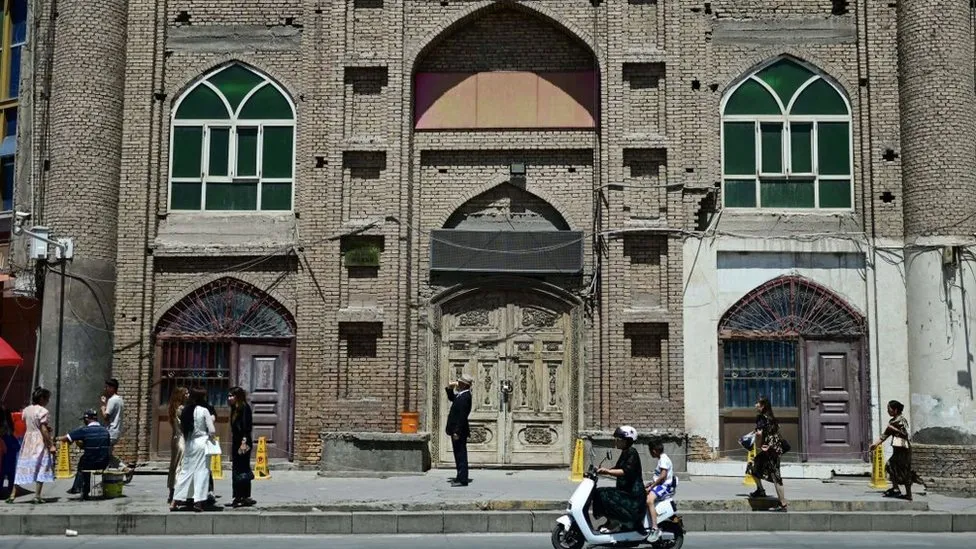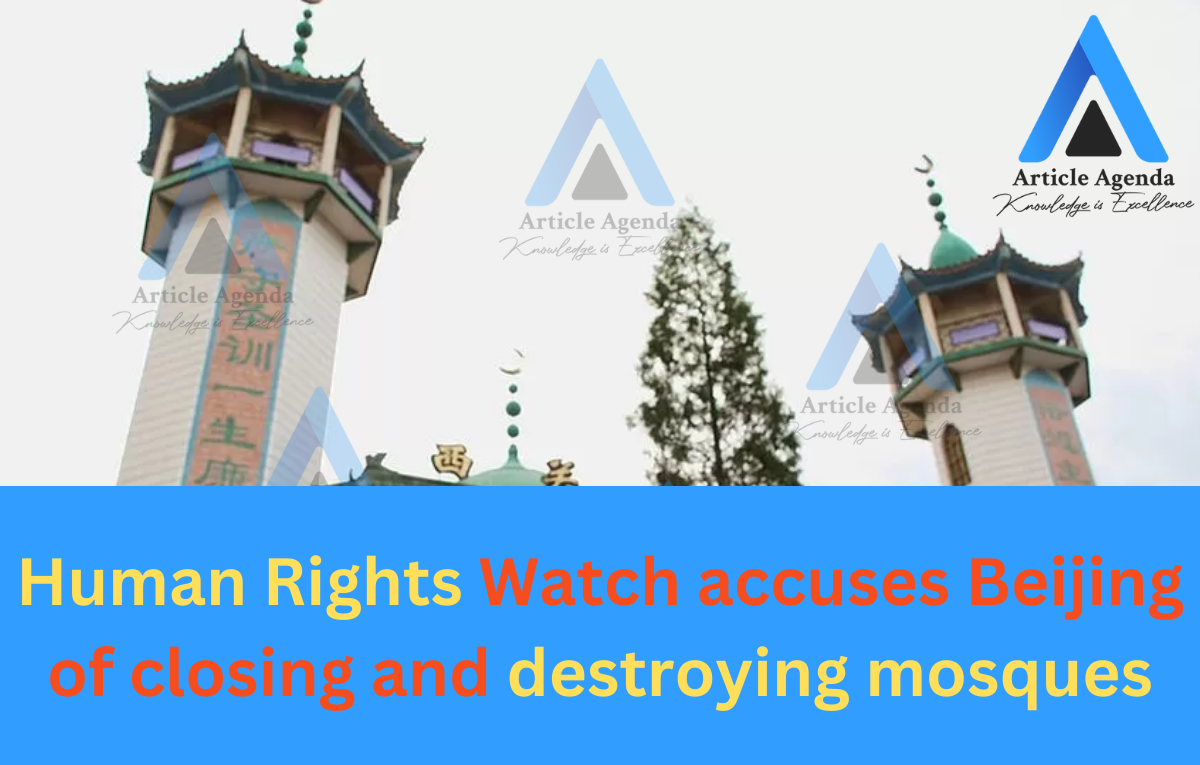Introduction
The Human Rights Watch report on Beijing’s actions towards mosques has shed light on the alarming situation of religious freedom in China. The report highlights the closure and destruction of mosques by the Chinese government, which has raised concerns about the violation of human rights and religious freedom in the country. This article aims to provide a comprehensive analysis of the issue, including the history of Islam in China, the specific mosques that have been targeted, the reasons behind Beijing’s actions, the impact on the Muslim community, the response from the international community, a comparison with other countries’ treatment of religious minorities, the Chinese government’s response to the accusations, and possible solutions to address the issue.

Table of Contents
- Introduction
- History of Islam in China and the current state of religious freedom
- Details of the specific mosques that have been closed or destroyed by Beijing
- Analysis of the reasons behind Beijing’s actions towards mosques
- Impact of the closures and destruction on the Muslim community in China
- Response from the international community and human rights organizations
- Comparison with other countries’ treatment of religious minorities
- Discussion of the Chinese government’s response to the accusations
- Possible solutions to address the issue of religious freedom in China
- Conclusion and call to action for the protection of human rights in China.
History of Islam in China and the current state of religious freedom
Islam has a long history in China, dating back to the 7th century when Arab traders arrived. Over the centuries, Islam spread and became integral to Chinese culture, particularly in regions such as Xinjiang, Ningxia, and Gansu. Today, China is home to approximately 23 million Muslims, making it one of the largest Muslim populations in the world.
However, despite this long history and significant presence, religious freedom for Muslims in China is severely restricted. The Chinese government imposes strict regulations on spiritual practices and institutions, including mosques. The state controls all religious activities and requires religious organizations to register with the government and adhere to its guidelines. This level of control has led to a climate of fear and surveillance, where Muslims are constantly monitored, and their religious practices are heavily regulated.
Details of the specific mosques that have been closed or destroyed by Beijing
The Human Rights Watch report highlights several specific cases of mosques that Beijing has closed or destroyed. These include the Weizhou Grand Mosque in Ningxia, which was forcibly closed in 2018; the Kargilik Mosque in Xinjiang, which was demolished in 2018; and the Dongguan Mosque in Gansu, completed in 2019.
The closures and destruction of these mosques have had a devastating impact on the local Muslim communities. These mosques were not only places of worship but also served as important cultural and social centers for the Muslim community. The loss of these mosques has disrupted religious practices and has left the community without a place to gather and connect.
Read More: Uncovering the Top News Sources in Pakistan: Your Guide to Finding the Best News Source
Analysis of the reasons behind Beijing’s actions towards mosques
There are several reasons behind Beijing’s actions towards mosques. One of the main reasons is political motivation. The Chinese government views any form of organized religion as a potential threat to its authority and control. By targeting mosques, the government aims to suppress any possible dissent or opposition that may arise from religious communities.
Another reason is the fear of extremism. The Chinese government has justified its actions by claiming that it is combating religious extremism and terrorism. However, many argue that these actions are disproportionate and target innocent Muslims who have no involvement in extremist activities. The government’s approach of collective punishment, where entire communities are punished for the actions of a few, is not only unjust but also counterproductive in addressing the issue of extremism.
Lastly, Beijing’s actions towards mosques can be seen as a desire for control. The Chinese government seeks to control all aspects of society, including religion. By closing and destroying mosques, the government is asserting its authority and sending a message that it will not tolerate any form of religious expression that is not under its control.
Impact of the closures and destruction on the Muslim community in China
The closures and destruction of mosques have had a significant impact on the Muslim community in China. Firstly, it has disrupted their religious practices. Muslims can now not gather for prayers or engage in other religious activities in their local mosques. This has affected their spiritual well-being and limited their ability to practice their faith freely.
Secondly, the closures and destruction have psychologically impacted the community. Mosques are not just places of worship but also serve as important cultural and social centers for Muslims. The loss of these spaces has left the community feeling isolated and marginalized. It has also created a climate of fear and uncertainty, where Muslims are constantly under surveillance and live in fear of further persecution.
Lastly, the closures and destruction have had an economic impact on the Muslim community. Many mosques were not only places of worship but also generated income through various activities such as religious education, tourism, and charitable donations. The loss of these sources of income has further marginalized the community and made them more vulnerable to economic hardship.
Response from the international community and human rights organizations
The international community and human rights organizations have expressed deep concern over Beijing’s actions towards mosques and the violation of religious freedom in China. Governments and organizations from around the world have issued statements condemning these actions and calling for an end to the persecution of religious minorities in China.
For example, the United States government has called on China to respect religious freedom and protect the rights of its Muslim population. The European Union has also expressed concern over the situation and has urged China to uphold its international human rights obligations. Human rights organizations such as Amnesty International and Human Rights Watch have documented and reported the violations in China, raising awareness and advocating for change.
Comparison with other countries’ treatment of religious minorities
To better understand the severity of the situation in China, it is essential to compare it with other countries’ treatment of religious minorities. While no country is perfect, there are significant differences in how governments approach religious freedom.
For example, in countries such as Canada, the United States, and many European nations, religious freedom is protected by law, and governments are committed to upholding this right. Religious minorities can practice their faith without fear of persecution or discrimination. In contrast, China’s actions towards mosques and its treatment of religious minorities demonstrate an apparent disregard for religious freedom and human rights.
Discussion of the Chinese government’s response to the accusations
The Chinese government has consistently denied any wrongdoing and has justified its actions towards mosques as necessary for national security and social stability. Beijing argues that it is combating religious extremism and terrorism and that its activities are in line with international norms and practices.
However, many argue that these justifications are unfounded and do not justify the violation of religious freedom and human rights. The Chinese government’s approach of collective punishment, where entire communities are targeted based on the actions of a few, is not only unjust but also counterproductive in addressing the issue of extremism. It is essential for the international community to hold the Chinese government accountable for its actions and to demand respect for religious freedom and human rights.
Possible solutions to address the issue of religious freedom in China
Addressing the issue of religious freedom in China requires a multi-faceted approach. Diplomatic pressure is one possible solution, where governments and international organizations can use their influence to urge China to respect religious freedom and protect the rights of its Muslim population. Economic sanctions can also be considered a means to pressure the Chinese government to change its policies.
Furthermore, international legal action can be pursued to hold the Chinese government accountable for its actions. This can involve bringing cases before international courts or tribunals to seek justice for the victims of religious persecution in China. The international community must work together to find practical solutions and ensure that religious freedom is protected in China.
Conclusion and call to action for the protection of human rights in China.
In conclusion, the closure and destruction of mosques by Beijing is a clear violation of religious freedom and human rights in China. Political motivations, fear of extremism, and a desire for control drive the Chinese government’s actions. These actions have had a devastating impact on the Muslim community, disrupting their religious practices, causing psychological distress, and creating economic hardship.
The international community and human rights organizations are responsible for speaking out against these violations and advocating for the protection of human rights in China. Governments, organizations, and individuals must take action to pressure the Chinese government to respect religious freedom and uphold its international human rights obligations. Only through collective efforts can we bring about change and ensure that all individuals, regardless of their religious beliefs, can practice their faith freely and without fear of persecution.


